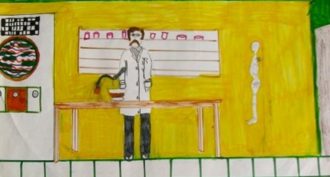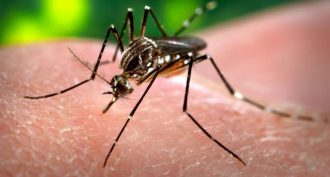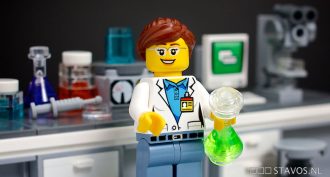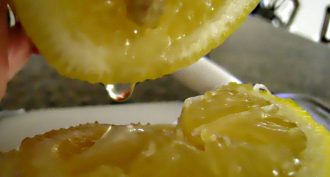
Bethany Brookshire was a longtime staff writer at Science News Explores and is the author of the book Pests: How Humans Create Animal Villains. She has a B.S. in biology and a B.A. in philosophy from The College of William and Mary, and a Ph.D. in physiology and pharmacology from Wake Forest University School of Medicine. She was a 2019-2020 Knight Science Journalism Fellow at MIT, the winner of the Society for Neuroscience Next Generation Award and the Three Quarks Daily Science Writing Award, among others.

All Stories by Bethany Brookshire
-

Students depict more scientists as women than ever
The image of a male scientist with crazy hair is slowly becoming less, well, male, new research shows. Yet, sadly, the nerd-factor remains.
-
 Physics
PhysicsScientists Say: Potential energy
This is the energy an object has because of its position or condition.
-

Watching water dance and seeing music as lights at family science expo
Family science days offers science learning for everyone, from good vibrations to endangered animal species.
-
 Animals
AnimalsRoadkill : Learning from the dead
Roadkill can be more than a smooshed-up carcass. Scientists study these highway casualties to learn more about wildlife and their environments.
-
 Health & Medicine
Health & MedicineScientists Say: Zika
Zika virus has burst into the news because it is linked with microcephaly — a condition where babies are born with small heads.
-
 Chemistry
ChemistryScientists Say: Precipitation
Chemicals can dissolve into a solution, but when they come out, they precipitate.
-
 Brain
BrainScientists Say: Amusia
When you can’t carry a tune, you might have amusia, a brain disorder where people can’t tell one note from another.
-

Using the smallest words for the biggest concepts
Many people think that big scientific concepts require big, complex words. A new book shows that — in some cases — simple words work just as well.
-
 Chemistry
ChemistryScientists Say: Solution
In math, this is just the answer to your problem. In chemistry, this word means something else entirely.
-
 Chemistry
ChemistryScientists Say: Base
Bases are chemicals that contain negatively charged chemical groups made from oxygen and hydrogen. They lend coffee its bitter flavor and have pH rankings higher than 7.0.
-

How kids ‘see’ scientists depends on what they read
When students draw a scientist, they rely on messages from textbooks and other media. Now do your own version of the experiment and see if your results match.
-
 Chemistry
ChemistryScientists Say: Acid
When a chemical tastes sour, ranks below 7.0 on the pH scale and has many hydrogen ions in its solution, it gets a special name.